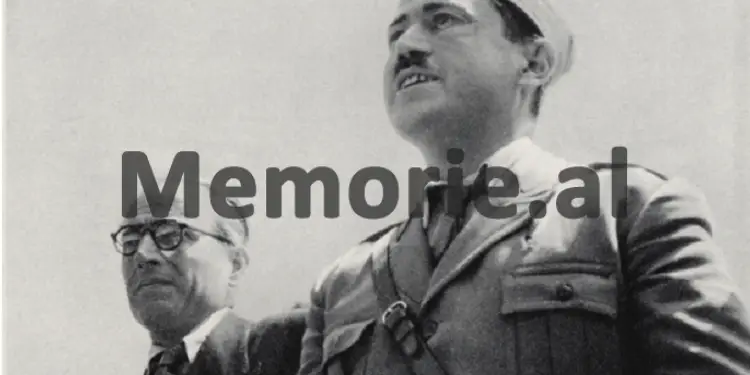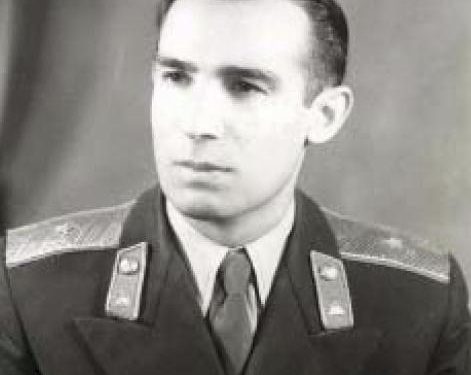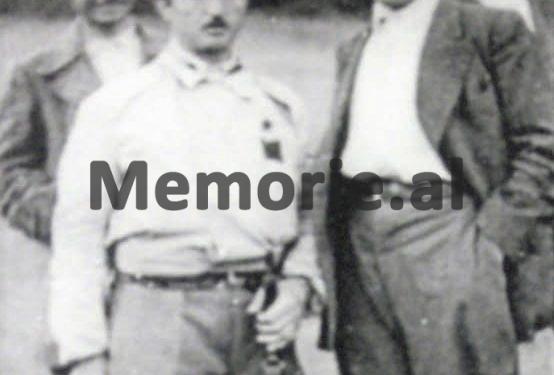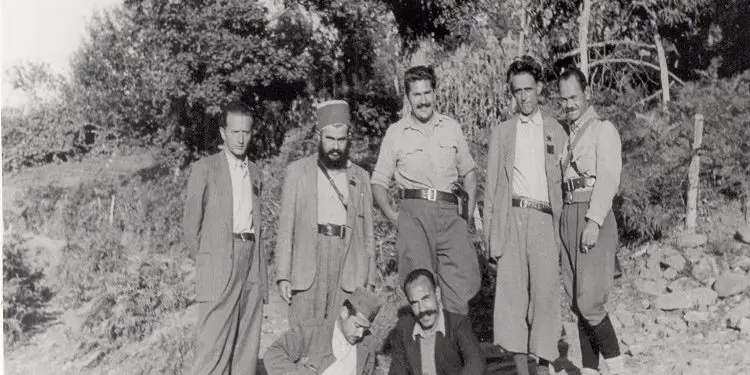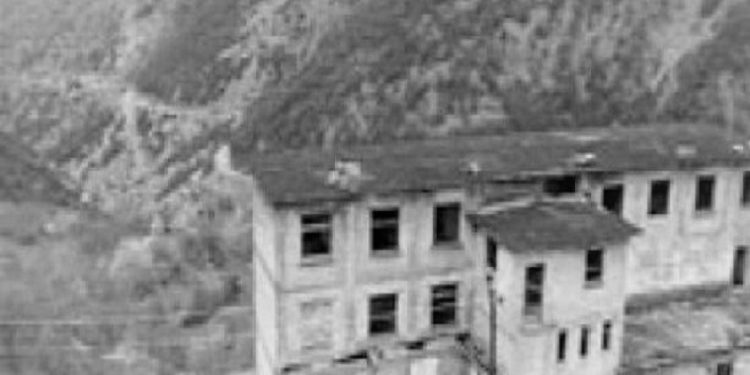By Albert Kotini
Memorie.al / In October 2010, Avni Maliqi (Agolli) passed away after a serious illness. For several weeks, I visited and talked often with this pinjoll of the prominent Dibran tribe of Agolles, who was a living archive of the history and sufferings, not only of his own family, but of the entire heroic area of his origin. And if there was a concern that, Avni Maliqi did not hesitate to express more than once during our conversations, it was not (as one might guess), the concern to highlight the history of this ancient chimney as well as possible. , but the concern that; Dibra and its people should not be divided even today in modern times, just like back then by Slavo-communism, which introduced fratricide into the home and family. Relatively speaking, that of the Agolles, is a story that cannot be easily listed in one article, but let’s start from the beginning. Which marks an old, almost four-century-old settlement in Dibra, where each generation has honored its responsibility of the war against the Ottomans, Serbs and any power that has tried to enslave Dibra?
The first of the Agolles, Sheh Murat Bey and then his son Aliu, settled in Kirçisht, a place at the foot of the mountain, protected with an exit to the forest, where the conqueror could not capture it. They were in good economic condition and quickly built up wealth that spanned four villages; Lower Kirçisht, Eperm, Herbel and Dovolan. This dagger and the little Turkish culture that Sheh Murat had, caused the epithet Aga to come naturally from the inhabitants of the area, from where the surname of the Agolli tribe remained.
Almost all the heirs of Ali Aga over the years have been killed in the war against the Turks. Thus, Rushit Agolli (aga) is killed in Dibër te Madhe, in the 1840s against the Turks, as well as his son, Jashar Agolli, in the war against them, leaving Malik Agolli (1870-1922) as the first heir. , with which the new history of the Agolles of Dibra begins.
Maliq Agolli, is mentioned many times in the history of Dibra. But he would have a special role in the Congress of Dibra in 1909, where the Albanian alphabet was discussed, which was decided by the Congress of Bitola, being a delegate of the area, for ten villages. Despite all the efforts of the young Turks, for this congress to come out with the decision that; Albanian had to be written in Arabic letters, the goal was not achieved, because the delegates voted by majority in favor of Latin letters.
On the other hand, the influence of Malik Agolli in the area would also increase due to a social fact. His first wife, (from the Strazimires tribe), Xhibja, had given birth to four daughters and she herself, in order not to “close the door” to the Agolls, brought her husband’s second wife, from the Kalosh tribe, to her home. With Asllan Kaloshi’s daughter, Hajrije, Maliq Agolli had two daughters, Naze and Nazmi, and two sons, Ali and Ferik. These descendants were connected in krushqi with the most famous doors of Dibra: Lleshi, Ndreu, Kaloshi, etc.
Throughout these fiery years for the Albanian issue, where the area of Dibra was of special sensitivity, Maliq and Ali Agolli were in the first ranks of those who set the tone for this war. In addition to the activism alongside Elbasanli Ahmet Dakli, for the spread of Albanian schools, the bloody clash with the Serbs, who burned the Agolls’ house three times, was of primary importance.
Initially, while the International Commission was defining the Albanian border in 1913, Serbian officials offered the Agolls large sums of money to buy their cattle, so that the lands and pastures could be certified as “Serbian”, because they used to graze their cattle there. , thus the Albanian border was defined by the river Drin, leaving out a part of the Dibra.
The answer of Malik Agolli, given to the Serbian chieftain, has remained in history: “This money, which you give me in the name of the kingdom, I have not done any favors for him to reward me”! But not only that; he gathered the territorial forces and opposed with arms the border project through Drin, causing the International Commission to place the border where it is today, in Bllacë. The representatives of the Commission themselves have stayed two weeks at the house of the Maliqs, who with 500 men under arms, defended the border on the Bllace-Korab line. Thus, this part of the Little Dibra escaped without being included under Serbia.
In addition, Maliq Agolli was in charge of 150 volunteers, at the disposal of the temporary government of Vlora, against the Assadists; aligned with the patriots Elez Isufi, Jusuf Xhelili, Dine Maqellara, Ramadan Cami and Mersin Dema, in March 1917; strongly supported the government of Durrës and the Congress of Lushnje, while in September 1921, together with other Dibra leaders, he fought on behalf of the national government against the Serbs in the area of Luma and Lura.
And although the clash with the Serbs has been continuous, it is meaningful the fact, which is well known in Dibër, that the Orthodox-Macedonian families of the area have been protected by the Agolls, just as the story of Tona, a Macedonian woman from Kerçisht, who hid Malik’s children, saving them from the Serbs.
For this connection, in the State Archives, there is also this letter from 1943, from the Archbishop of the Albanian Autocephalous Orthodox Church, Kristofori, to Ali Maliq, to whom he addresses with full confidence, to protect all the Orthodox of Dibra. …! A year later, in October 1922, quietly withdrawn in his life, Maliq Agolli, passed away, taking with him the respect and honor of everyone.
Ali Maliqi (Agolli), active since his early youth with his father, for Albanian schools, he too would leave his mark in the history of Dibra and in the entire epic of Albanian resistance. In addition to the Arab culture he benefited from (from Effendi Faik Hoxha, studied in Istanbul), he also learns Italian and reads every book with pleasure. He also proved this passion for culture with his deeds: In 1916, he took care of the construction of the school with 250 students and 6 normalist teachers, which he set up in Kirçisht. On April 7, 1939, Ali Maliqi was at the head of 1,000 Dibra men in Qafë Shtame, while September 1939 would mark the privations of his life.
Arrested for rebellion against the fascist occupier and after 9 months, the investigator was exiled with his brother, Ferik, to the Ventotene islands, from where he was released only in December 1942. From this year, until the capitulation of Italy, he remained under surveillance in the gorges of the Dibra Mountains. , but he, in cooperation with Fiqiri Dinen, had the courage to oppose the Italian invasion. The Italian troops surrounded him in March 1943, together with the insurgent forces in Homesh, while a month later, under the fascist repression; he was forced to move his family to the depths of Lura.
But anti-fascism did not necessarily make Ali Maliq close to communism. Stalin’s deeds against his own people and the true state of the Soviet Union, Ali knew very well. All the more so that immediately after the Italian capitulation, over two thousand Macedonian partisan forces flocked to Dibër e Madhe, which received the ultimatum to leave immediately? Maliqi, in coordination with the forces of Miftar Kaloshi, Ukë Camit and Xheme Gostivari, causes the Macedonian forces to retreat after three days of fighting. A life spent under direct Slavic danger naturally made Ali Maliq very cold towards communism.
As an anti-communist and as a danger that had to be eliminated, the name of Ali Maliq was also mentioned in the books of the dictator Enver Hoxha. But earlier than this period, he was mentioned in the files of the fascist secret service, as an anti-fascist and as a man of high reputation in Dibër, who was hated by the Yugoslavs. It is therefore understandable why this figure would be seen as a “reactionary” by the pro-Yugoslav partisan leaders of Dibra, such as Haxhi Lleshi, who in the Italian files appeared as a collaborator and under payment by the Yugoslav services.
By the end of 1944, he had the opportunity to leave the country. But this option of leaving the homeland was not for Ali Maliq. In January 1945, a general amnesty was announced and many sympathizers suggested that he surrender. But this is where the real privations began for Ali Maliq, who immediately exiled him to Korça, and after a month brought him to Tirana.
On May 12, 1945, he was brought to trial. In his defense, the villages of Struga, Dibra and Gostivar, who considered him their savior, protested. But the newly installed dictatorship sentenced him to death along with 12 other friends. Under the pressure of popular respect, from all over Dibra, he is spared his life anyway.
But this “forgiven” life was a constant torture, starting from the prison-hell of Burrell. For Ali Malik, the State Security set up all kinds of traps, allegedly for his “escape” from prison, etc. On the other hand, the family was terrorized in camps, prisons and exiles, for 47 consecutive years.
When his prison term was coming to an end (even for 20 days), Ali Maliq was organized behind the scenes to kill him, in Ward 309 of the Cement Factory in Elbasan. On May 12, 1967, he was shot in the back with a crowbar and fell from a great height. The event was disguised as an accident, but the fellow sufferers knew the truth. According to his co-sufferer in prison, Tanush Kaso, Sigurimi worked with a half-friend of Ali’s, to organize the murder “in progress” at any cost. And the macabre order was carried out.
Through the vivid accounts of the son of Ali Malik, we can create a clear idea today about the strong clashes and dilemmas between nationalism and communism, not only between different groups during the war years, but also in the souls of people.
Once upon a time, under the linear, black-and-white historiography of the communist dictatorship, it might have seemed incredible that an enemy of the fascists and a long-term internee on the infamous Ventotene Islands could be at the same time an opponent of the communists. But as is known today, in the first years of the War, the debates between a patriot who was ready to take up arms for his country and a communist militant, were conversations or retorts between people who respected each other, why not between friends and friends Precipitation and degradation would come a little later.
“I was only 11 years old”, Avni Maliqi says, among other things, in his confessions, “when on April 5, 1941, they gave me a letter from Haxhi Lleshi, in the absence of my father who was interned in Italy, and I was sent from Kerchishti in Pocesta. It was the time when Serbian-Italian fighting was taking place and in Dibër, there was the “Florence” Division. Haxhi Lleshi’s order was to tell some of the leaders of Dibra to organize and attack the Italian troops from behind. But in Maqellare-Kërçisht and Gollobordë, there was an entire Italian division and the attack with these few partisan and nationalist forces was just an adventure that interested the Serbs.
All the more so that the Italians were also helped by the Germans and for us it would be suicide. After the defeat of the Serbs, the Italian marshal, Gino Picini, comes to me, and since he was aware of the said letter which I denied, he shot me hard with his palm, even though the grandmother put her body in front of me. When I explained this event to Haxhi Lleshi, he promised me that he would kill the Italian marshal, an act he did not do. The nationalists did this.”
Avni Maliqi never forgot his father’s debates with Haxhi Lleshi, Dali Ndreu, etc., after Ali Maliqi was returned from exile at the end of 1942. “Not a few, but more than ten known communists, came to the house ours, to organize the communist cells in Dibër. They were separated: Pajo Islami and Sotir Vullkani in Slovenia, to Dali Ndreu; Zoi Themeli, Qazim Prishtina, Haxhi Lleshi, to the Agolles in Kirçisht, while Ramadan Çitaku, after two days, left for Martanesh and Tirana.
For the first time, as a child, I heard a debate in our house about what communism is equality for all, etc. So a philosophy that attracted me too”. But Ali Maliqi, part of the exile, had done it with Ali Këlcyra and Isuf Luz, and he knew well what communism entailed. While he was still away, in his house on July 22, 1942, the first detachment of Dibra was created, with Commander Haxhi Lleshi, Commissioner Qazim Prishtina and deputy commissioner Zoi Themelin. The massive desertion of Albanian officers towards the Italian-Greek front gave way to this creation.
Thus, many armed groups were created in Dibër, where the three main ones were; the group of Miftar Kaloshi, that of Slovakia with Esat Ndreu and that of Kirçishti, with Haxhi Lleshi, together with a force of over 2000 people. While this force was preparing at the end of 1942, to strike the entire Italian division, in fact an adventure, their leaders were contacted by the prefect of Peshkopia, Veip Runa, with the message; “Why kill us? I will give you as many weapons as you want.” One of the conditions of the Dibrans was the release of Ali Maliq from exile, which was done.
He had connections, friendships and strong friendships with the Lleshs, the Ndreu tribe, the Strazimirs, etc., but ideology had started to come in between. This part of the debate between Ali Maliq and Zoi Themel is significant: “You proletarians, communism will raise you to the top, and after it has introduced you to crimes against Albanians, then the day will come when you will not enter into the work of your ancestors and you will eat each other’s heads. This has been happening for 24 years, in the Soviet Union”.
And yet, the communists needed the influence of Ali Maliq and other leaders to raise the people of Dibra. A series of joint battles with the nationalists took place against the Italians and then the Germans, which were later retouched as if they were purely partisan battles. A separate story is the rescue and shelter for three months in the house of the Agolles, of the American paratrooper, James Hudson.
Even when the 5th Brigade burned the house, in July 1944, the family took the foreign boy with them to Tirana, until they handed him over to Abaz Kupi, who sent him to Bari. Meanwhile, the last message of Ali Maliq, in the face of the invitations of the communists, was this: “If you join the Serbs, I will find my way.”
Avni Maliqi did not want to talk much about the sufferings of his family after 1945. But the archive file of the Ministry of the Interior speaks quite clearly, where there is also a statement signed by the representatives of 33 villages of Dibran, who want to May Ali Maliq’s life be spared. The death penalty is annulled. But of course, this work was done later by Sigurimi.
In the decision of the Supreme Court, no. 198, dated 4.10.1956, the Military College of this court, led by Major Hilmi Telegrafi, with members Lieutenant Colonel Andon Sheti and Lieutenant Colonel Tomorr Spahiu, with Prosecutor Lieutenant Colonel Faik Minarolli and in the presence of the defense lawyer Vasil Laveni, the defendants Avni, Agim e, Fatrie Agolli, (children of Ali and Hilmia), as well as Nizajet Agolli (daughter of Ferik and Zeqije) are accused of having fled abroad, but they were returned to the border point of Bllace, by the Yugoslavs.
It seems that the Serbs returned the centuries-old resto to the Agolls. The court decided to sentence Avni to 15 years in prison, Agimi to 10 years in prison and the women to 5 years in exile in Lushnja. An ordeal that would continue for decades. Memorie.al





